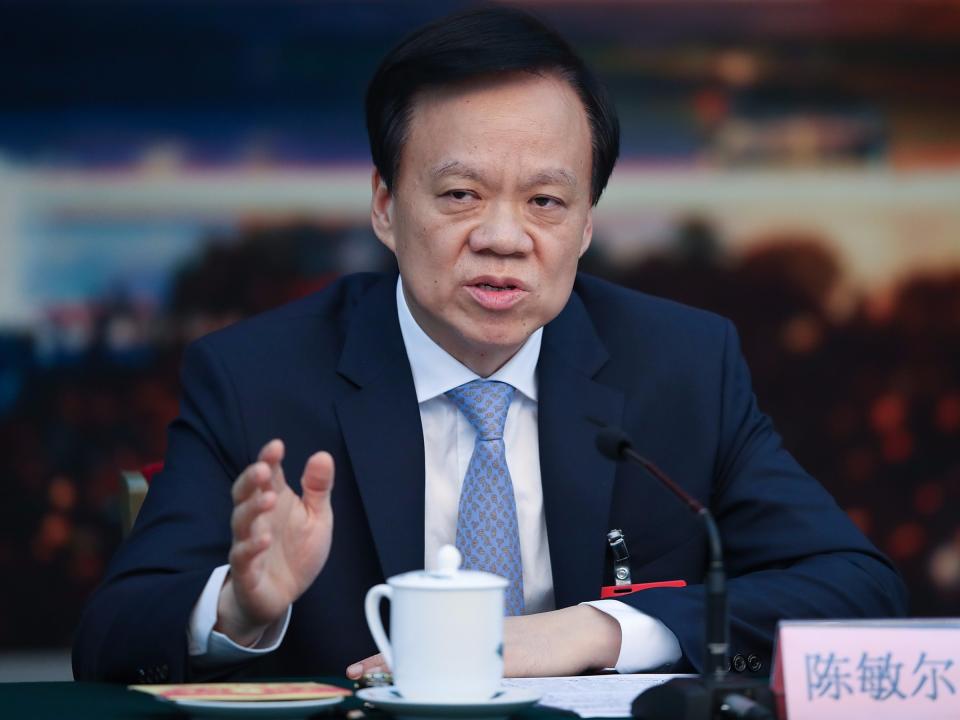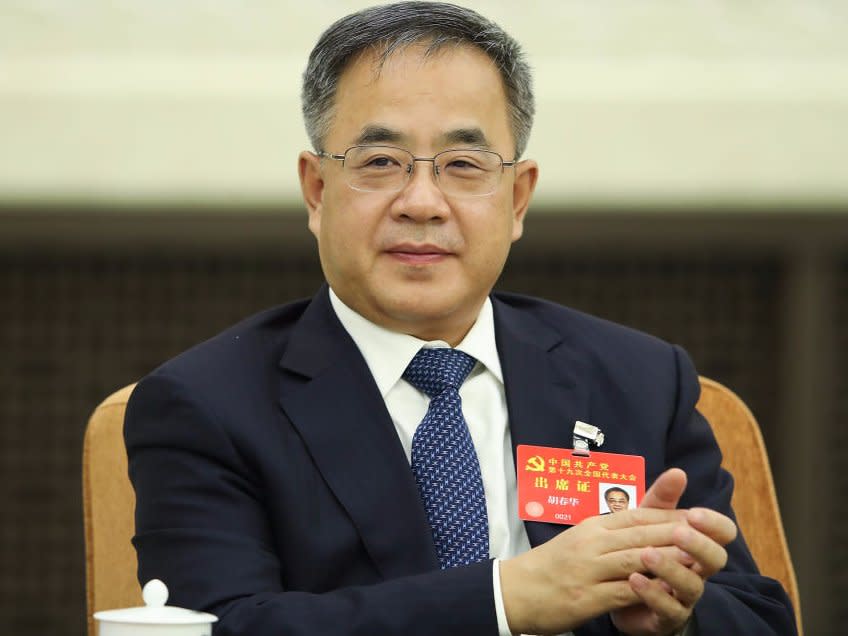Why China's president is unlikely to anoint a successor

REUTERS/Marko Djurica
The man once believed to become Chinese President Xi Jinping's successor is now fading from power.
Another political rising star is expected to be promoted to the Politburo, but will not likely be advanced to a higher committee.
If both politicians are not promoted to the Politburo Standing Committee, there may be no presumptive heir to take over from Xi Jinping.
The man once tipped to become President Xi Jinping’s successor, Guangdong party boss Hu Chunhua, is likely to become a vice-premier in March but his prospects of inclusion in the Communist Party’s top echelon of power, the Politburo Standing Committee, are fading, sources have told the South China Morning Post.
Meanwhile, Chongqing party boss Chen Miner, another rising star who is widely seen as the president’s protégé, is expected to win promotion to the 25-member Politburo but will probably not make it into the seven-member Politburo Standing Committee, sources familiar with top-level party discussions said.
Hu is already a Politburo member while Chen is now a Central Committee member — one rank lower in the party hierarchy. The Politburo Standing Committee sits on top, making it the highest decision-making body in Chinese politics.
If Hu, 54, and Chen, 57, do not win promotion to the Politburo Standing Committee next week, after the party’s national congress concludes on Tuesday, it would contain no putative heir in the position to take over from Xi after he completes his second five-year term as party general secretary in 2022.
Another contender, 54-year-old former Chongqing party chief Sun Zhengcai, suffered a spectacular fall from grace this year. He was expelled from the party last month and is now facing criminal prosecution for corruption.

Lintao Zhang/Getty ImagesSuch arrangements, if confirmed, will inevitably add to speculation that Xi plans to carry on beyond his second term. But sources said it was premature to draw such a conclusion.
Rather, they said, it reflected Xi’s dissatisfaction with the party’s present power transition mechanism. While it provides some certainty and stability, it also has some problems.
Leadership transitions in China have historically been a difficult and risky process. Mao Zedong changed his chosen successor three times, with the first two dying in controversial circumstances. Deng Xiaoping, after pushing aside Mao’s last pick, Hua Guofeng, ditched two of his own protégés before endorsing a third, Jiang Zemin.
Only in 2002 did the party leadership transition begin to have any resemblance to an institutionalized process. That year Jiang stepped down for Hu Jintao, Xi’s predecessor. Hu Jintao had been a Politburo Standing Committee member for 10 years by then, having been elevated to that position by Deng in 1992 as Jiang’s “designated successor”. Even then, Jiang only vacated the powerful chairmanship of the Central Military Commission two years later.
In 2012, Hu handed over all his party positions to Xi, who had been promoted to the Politburo Standing Committee in 2007 and became vice-president the following year. Xi publicly praised Hu’s “high ethics” for making a clean break possible.
Sources said that while the practice of having a “designated successor” waiting in the wings could give a sense of stability, it also put premature pressure on that person. Both Xi and Hu Jintao had to play the role of a cautious heir-apparent for years, taking care not to reveal too much of themselves or upstage their seniors.
“It also makes the heir-apparent an easy target,” one source said. “Other factions could set up traps to undermine him. People looking for advancement would seek to curry favour with him.”

Lintao Zhang/Getty Images
There was a risk a strong candidate could end up competing with the incumbent leader for influence. A weak heir-apparent, on the other hand, would create openings that would encourage factional rivalry and jockeying for power.
“Sun Zhengcai’s case, and the timing of its revelation, is a strong indication that Xi wants to break away from the designated successor system and reform it,” the source said.
While details of Xi’s plan were not immediately clear, the general idea was to eventually choose a successor from several possible candidates in a bigger pool, based on their performance.
“Xi is in no hurry to settle on the issue for now,” the source said. “His priority and focus is how to make use of his second term to achieve his goals. A lot of things can happen in five years.”
The party’s 19th national congress opened on Wednesday and will close on Tuesday. The new party Central Committee it elects will have its first plenum meeting the following day and officially produce the new line-up for the Politburo and the Politburo Standing Committee – thus completing the party’s leadership reshuffle.
The party leaders will then discuss and decide on personnel changes at the state level at the Central Committee’s second plenum in the spring, just ahead of the annual meeting of the National People’s Congress in March, which will formally endorse the proposed changes.
Both Hu Chunhua and Chen are most likely to be in the 25-member Politburo when the new list is unveiled next Wednesday, but would have to wait until March to have their new government posts confirmed.
Hu Chunhua, who has been the party chief of Inner Mongolia and Guangdong, has already garnered rich experience at the provincial level, preparing him for the vice-premier role.
Chen has been praised for his work on poverty alleviation and innovation in his previous post of Guizhou party chief. He was transferred to Chongqing in July to steady the boat after Sun’s shock removal – a move seen by political pundits as a show of leadership confidence in Chen.
NOW WATCH: The wives of El Chapo's henchmen reveal how they hid and spent $2 billion
See Also:

 Yahoo News
Yahoo News 

